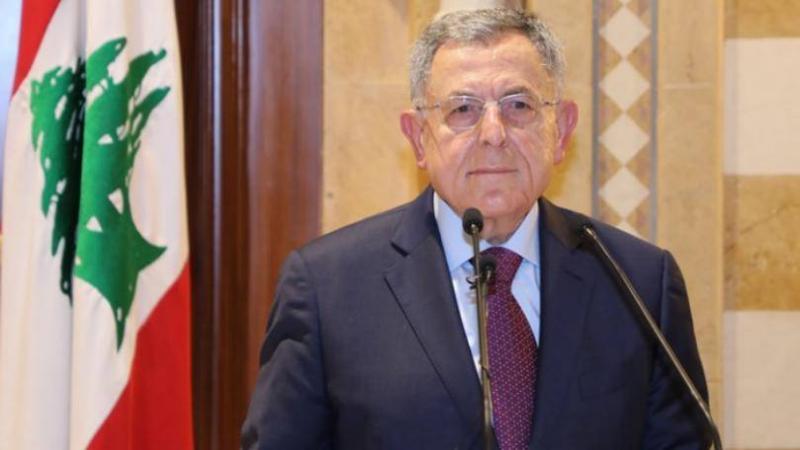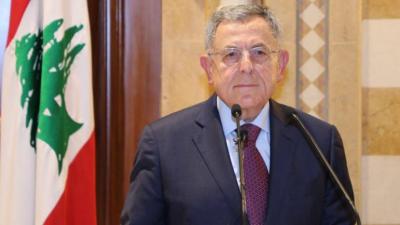Former Prime Minister Fouad Seniora stated in an interview with Al-Hadath channel that the results of the parliamentary elections were surprising to everyone. Predictions suggested that the differences might be marginal, with expectations that groups affiliated with Hezbollah and its allied parties would have a slight edge over sovereign lawmakers. However, the outcome reversed this expectation, as the sovereign and reformist forces secured around 68 seats compared to about 60 for the opposing team in the parliament. The electoral battle resulted in a significant defeat for several key figures representing what is termed the "resistance line," which is linked to Hezbollah and the Syrian regime.
He noted that this outcome carries many implications about the changing convictions and sentiments among Lebanese people, including Muslims, regarding the core issue that needs focus during this critical phase: the restoration of the Lebanese state from its captors. He pointed out that Hezbollah's domination over the Lebanese state, its policies, its free decisions, and its administrations has led to exacerbated practices over the past few years, resulting in a major imbalance in internal dynamics and Lebanon’s external relations, as well as negative impacts across national, political, economic, and living standards.
In response to a question about his support for certain electoral lists regardless of their results, Seniora said that he supported seven electoral lists across seven Lebanese regions. From those lists, seven electoral quotas won with the help of this support, enabling them to secure parliamentary seats: one in the "Beirut Faces" list, two in the "Lebanon for Us" list in the northern second district, one in the Zahle Sovereignty list, two in the Independent National Decision list in Western Bekaa and Rashaya, and at least one in the "Our Unity in Sidon and Jezzine" list.
He added, “Now that the smaller jihad has ended, the greater jihad has begun. It is essential to absorb these results and study them calmly and thoughtfully from a national and sovereign standpoint, away from bursts of joy. We must recognize that there are significant upcoming obligations starting with the election of the Speaker of the House and Deputy Speaker, as well as appointing the Prime Minister to form the new government, alongside the election of a new President of the Republic, which should occur within the next four months. Consequently, it must be noted that at that time, the Lebanese government will also need to resign and form a new government afterward. Additionally, attention must be paid to a series of important matters and decisions that the Lebanese government must determine its positions and decisions on, which concern political, economic, financial, and living crises.”
He continued, “In this regard, I believe that we should begin with the necessity of absorbing all past and present lessons from the political practices that occurred over the past decade, which led to the fragmentation and disintegration of the March 14 coalition, as well as the subsequent repercussions following the presidential settlement in 2016, and the adverse outcomes stemming from the poorly devised electoral law of 2017. All of this culminated in negative implications for both national and political landscapes in Lebanon. The essential point now is to understand the nature and seriousness of this phase, which necessitates that sovereign forces abandon personal ambitions and party desires that contributed to the shocking downfall of the March 14 coalition. Additionally, it is essential to understand the fundamental and important aspect of transcending minor disagreements and focusing on distinguishing between basic contradictions and secondary contradictions in the relationships of those forces with one another and with others, thus concentrating on the main issue: restoring the Lebanese state and the importance of liberating it from its captors. This is, in fact, the core problem in Lebanon, leading to rampant political corruption and an increase in patronage and sectarian pressures on the Lebanese state.”
He emphasized that “this requires all those forces to move beyond these small predicaments in their practices and to emerge from practices often seen as petty political games that have led to disputes among the sovereign groups. Consequently, this has resulted in the disintegration and fragmentation of these sovereign groups in Lebanon, ultimately leading to their failures. We must all refrain from repeating those mistakes and ensure that our work, efforts, and goals are clear in bringing these sovereign groups together around a framework and political program that focuses on the essential issue of restoring the state and reclaiming its free decision. Furthermore, this should include addressing fundamental issues related to national, political, and economic dimensions, and initiating the necessary reform policies and measures to extricate Lebanon from its crises.”
Asked if he was calling for a unified front, he replied, “The primary focus should be on recognizing a fundamental truth: that economic and living rehabilitation in Lebanon for the Lebanese cannot be achieved without the restoration of the sovereignty of the Lebanese state and its free decision. This requires those sovereign factions to unite around a work program with essential and achievable goals concerning fundamental issues. I have indicated the necessity of distinguishing between primary contradictions and secondary contradictions in the relationships among the sovereign forces. If we fail in that, we will find ourselves sinking once again into a deep mire with no hope of escape. We will reach a state where attention is diverted among those groups, engaging them in frantic competitions for small gains regarding specific positions, far removed from fundamental and core issues, ultimately overlooking the essential matters that need focus and sustainable solutions.”
He added, “We now find Mr. Hassan Nasrallah telling us to focus on living issues away from concerns regarding state sovereignty. He aims to obscure the core issue regarding the Lebanese state and its sovereign freedom, so we merely address symptoms of problems without delving into the real underlying causes. We know that we cannot emerge from these predicaments without focusing on the fundamental issues and the crux of the problems, while not neglecting the manifestations of the crises the citizens face. Within this comprehensive approach to the issues lies the opportunity to regain the Lebanese trust in a better future, as well as the trust of the Arab and international communities in Lebanon and the Lebanese people, thereby enabling Lebanon to find the correct path to recovery. This, at its core, is the responsibility of those sovereign forces, as they must awaken themselves and cooperate among themselves to escape the multiplying and worsening crises in Lebanon.”
He declared that “everyone must be insightful and act with great awareness regarding the nature of the problems that are suffocating Lebanon, as well as the nature of the phase we are currently amidst. There is a notion that has resonated with many, centered on the phrase: 'Everyone means everyone.' This matter has led to the obfuscation of action and obfuscation of the actor. The correct path to address the repercussions of this notion is to start from a basic principle: that there should be no immunity for any group or individual responsible for the past, resulting from poor management or waste. By adopting this principle, we can ensure that no entity should be immune from accountability regarding any issues pertaining to public affairs or public funds. Based on that, this rule needs to be applied strictly and persistently on the basis of accountability and institutional questioning, rather than on media and populist accountability meant for political vendettas. This will facilitate proper governance in managing state affairs.”
He added, “Beginning with the adoption of this principle, the focus for sovereign forces must return to common issues among themselves; otherwise, if small contradictions continue to govern their relationships, it will lead to fragmentation and distancing within this sovereign group. Notably, the opposing forces are indeed more disciplined and unified among themselves because there is someone who manages this unifying process among them; there is, as they say, an orchestra conductor with the authority to make decisions. Thus, even if this resistant team does not currently possess the absolute majority in parliament, there is potential for them to unify their positions, and perhaps they could effectively attain a majority through the solidarity of their members. This is particularly relevant as certain contradictions are overstated among the sovereign faction, while others aim to magnify and exacerbate them, drawing some sovereign individuals into their labyrinth, ultimately leading to the fragmentation of the sovereign group, making it unable to confront attempts to scatter and divert it from its comprehensive reform path.”
He called for “a true national perspective that comprehensively absorbs all experiences and mistakes, with clarity for everyone on the importance of ensuring that its members possess vision and determination, along with leadership, courage, and sincerity in addressing all these pressing matters. All these issues must be clear to everyone, as they must rise together and believe in their ability to rally the Lebanese towards finding real solutions to these escalating issues on various national, political, economic, and living fronts, thereby restoring the Lebanese state. Otherwise, if stagnation and retreat continue, we will revert to unproductive disputes, and thus these forces will be incapable of confronting these significant predicaments.”
He stressed “the necessity for coordination, communication, and ongoing understanding of priorities among sovereign forces regarding these positions. Thus, these matters must be agreed upon by all, for unless there is coordination and cooperation built on an understanding of the nature of the phase and the nature of the problems, along with a precise delineation of priorities, it will become impossible, driving Lebanon into a maze that intensifies suffering, leading to further regression and collapse.”
He indicated that "the parties that should represent are the reformist factions and those who believe in change and the restoration of Lebanon's sovereignty and its free decision, as well as the governance of its government administration, respecting Lebanon's interests and those of the Lebanese in their relations with their brothers and friends while respecting both Arab and international legitimacy." He concluded: "The nature of the results emerging from the elections has shown that there is a group of MPs who can unify and agree on a fundamental political stance, including the Lebanese Forces, the Kataeb, the Progressive Socialist Party, the Democratic Gathering, and other sovereign groups affiliated with numerous reformists who believe in these principles. The actual practices should adhere to these principles while transcending secondary contradictions. This embodies the essence of the problems facing Lebanon, leading to the necessity of returning to pinpoint the reality of these issues in core political matters, which we should prioritize and focus on restoring the Lebanese state to its free decision, establishing a unified state across all Lebanese territories, free from duality of governance and the domineering practices exercised by Hezbollah and, behind it, Iran, without overlooking the living and social issues that the Lebanese are suffering from."
Regarding Hezbollah's weapons, Seniora stated: "The living problems facing the Lebanese are overwhelmingly predominant. Yet, we must recognize that reaching solutions to these pressing issues cannot happen without parallel advancements on fundamental paths addressing the causes that led to these collapses. Thus, if that condition is absent, these interventions will be limited to addressing symptoms rather than their essence, thereby rendering these interventions incapable of providing real and lasting solutions to these issues, which could ultimately lead to further waste of efforts and squandered opportunities now available for Lebanon and its people."




